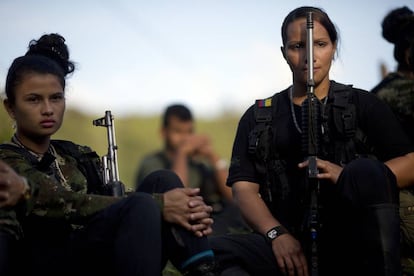Colombian government and FARC rebels announce “bilateral and definitive” ceasefire
Details on ending one of the world’s longest-running conflicts will be released on Thursday in Havana

After more than half-a-century of violence, which has left more than 200,000 people dead, the Colombian government and the forces of the left-wing FARC guerrilla movement have announced a “bilateral and definitive” ceasefire they say will lead to a conclusive peace agreement.
The two sides, which have been negotiating in the Cuban capital of Havana since November 2012, will make an official announcement on Thursday at a ceremony in to mark the ceasefire that will be attended by Colombia’s president, Juan Manuel Santos, FARC leader Rodrigo Londoño and other Latin American leaders. Negotiators say a final peace deal will be reached in the days or weeks to come.
Further details are expected to be released on Thursday outlining a timetable, disarmament, security guarantees for guerrillas, as well as justice for victims. Both parties are discussing designating zones where the FARC's estimated 7,000 remaining fighters can gather for a UN-supervised demobilization process, all of which is expected to take up to a year to implement, during which time a definitive peace agreement will be signed. Throughout the negotiations, the FARC has demanded guarantees that its forces will be protected after they lay down their arms.
Both parties are discussing designating zones where the FARC’s estimated 7,000 remaining fighters can gather for a UN-supervised demobilization process
Wednesday’s statement specified that the end of the war with the FARC means “the fight against the criminal organizations responsible for homicides and massacres or that have acted against human rights defenders, social or political movements.” It directly refers to “criminal organizations that have been identified as the successors to para-militarism and its support networks, and the persecution of criminal conduct that threatens the implementation of the agreements and building peace.”
Also expected in Havana on Thursday will be UN Secretary General Ban Ki-Moon, Cuban President Raúl Castro, Norway’s foreign minister, Borge Brende, Chilean President Michelle Bachelet and Venezuela’s President Nicolás Maduro. US special envoy Bernie Aronson and his EU counterpart Eamon Gilmore will also attend.
Colombia has been in conflict since a rural uprising began in the 1960s. It has included a number of leftist rebel groups, right-wing paramilitaries and drug cartels.
Human rights groups say atrocities have been committed by all sides, and an estimated five million people displaced. Many families are still searching for missing loved ones.
Ongoing peace talks received a boost when the FARC declared a unilateral ceasefire a year ago, agreeing to remove child soldiers from its ranks as part of the peace deal. According to government figures, authorities have taken some 6,000 children from illegal armed groups over the past 17 years, more than half of them from the FARC.
English version by Nick Lyne.
Sign up for our newsletter
EL PAÍS English Edition has launched a weekly newsletter. Sign up today to receive a selection of our best stories in your inbox every Saturday morning. For full details about how to subscribe, click here.
Tu suscripción se está usando en otro dispositivo
¿Quieres añadir otro usuario a tu suscripción?
Si continúas leyendo en este dispositivo, no se podrá leer en el otro.
FlechaTu suscripción se está usando en otro dispositivo y solo puedes acceder a EL PAÍS desde un dispositivo a la vez.
Si quieres compartir tu cuenta, cambia tu suscripción a la modalidad Premium, así podrás añadir otro usuario. Cada uno accederá con su propia cuenta de email, lo que os permitirá personalizar vuestra experiencia en EL PAÍS.
¿Tienes una suscripción de empresa? Accede aquí para contratar más cuentas.
En el caso de no saber quién está usando tu cuenta, te recomendamos cambiar tu contraseña aquí.
Si decides continuar compartiendo tu cuenta, este mensaje se mostrará en tu dispositivo y en el de la otra persona que está usando tu cuenta de forma indefinida, afectando a tu experiencia de lectura. Puedes consultar aquí los términos y condiciones de la suscripción digital.









































